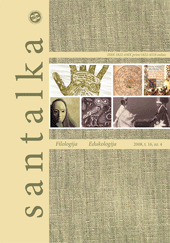Iš terminų radimosi, kūrimo irfunkcionavimo patirties
Insights into the Birth, Invention and the Function of Terms
Author(s): Marija Liudvika DrazdauskienėSubject(s): Language and Literature Studies
Published by: Vilnius Gediminas Technical University
Keywords: term(s); neologism(s); meaning; the etymology and use of terms; theoretical questions; usag; the acceptability of neologisms; the method of a Two-Cycle Model of Grammar; semantic relations in language and their dependence.
Summary/Abstract: The problem of the article is the question of the spread of doubtful usage in which untested terms and unsorted new words appear. It is also a question of professional expertise, language and culture as they apply to the sensitive issues in usage. These observations and an assessment of some phenomena in modern Lithuanian and English usage have been made with resort to the concept of the functional nature of language. It has been taken for granted that the system of language is a system of meaning determined by the functions of language it has evolved to serve. The concept that actual usage only reflects the lexicogrammatical options the speaker had made from the system necessitated by the meaning he had intended to express has also a truth value for the author of the present article. In the context of contemporary questions of terminology, the basic aspects of the etymology of terms are considered and ways of the creation of current terms in Lithuanian are reviewed, which is backed up by the American criticism of the unacceptable practices. Parallels between terms and neologisms are drawn only to show the unacceptable usage in Lithuanian. The method of aTwo-Cycle Model of Grammar is applied to motivate the assessment of the unwanted neologisms in this language. The model use of physical terms in Lithuanian is resorted to to counter the vicious practices. The influence of terms on the systemic relationsin language and on its syntax is illustrated by analysing a few instances of scientific English usage. The significance of the conceptual meaning of terms is found to motivate deviations in the syntax of scientific English. But scientific usage is shown to merit praise otherwise and the culture of scientists to have thepotential to improve even general usage. It is assumed in conclusion that the speaker‘s concern with meaning can potentially oust undesirable usage together with his ungrounded psychological reactions to new terms and neologisms in general. The linguists are likely to earn a favourable attitude in the same conditions.
Journal: Santalka: Filologija, Edukologija
- Issue Year: 16/2008
- Issue No: 2
- Page Range: 147-165
- Page Count: 19
- Language: Lithuanian

